The WorldCom Collapse: A Deep Dive into Auditing and Assurance
VerifiedAdded on 2022/11/23
|9
|2489
|147
Report
AI Summary
This report provides an in-depth analysis of the WorldCom collapse, a major accounting scandal that highlighted significant failures in auditing and assurance practices. The report examines the fraudulent activities undertaken by WorldCom's management, including the misrepresentation of expenses as capital expenditures to inflate earnings, and the role of the auditing firm, Anderson Accounting, in failing to detect these irregularities. Key issues discussed include the impact of self-interest on auditor independence, the lack of due diligence, and violations of accounting practices. The report emphasizes the importance of adhering to auditing principles, specifically APES 110, and maintaining professional skepticism to ensure the accuracy and reliability of financial statements. The analysis underscores the need for robust internal controls and the critical role of auditors in preventing financial fraud and maintaining market integrity. The report concludes with a discussion on the lessons learned from the WorldCom collapse, emphasizing the importance of ethical conduct, competence, and diligence in the auditing profession.
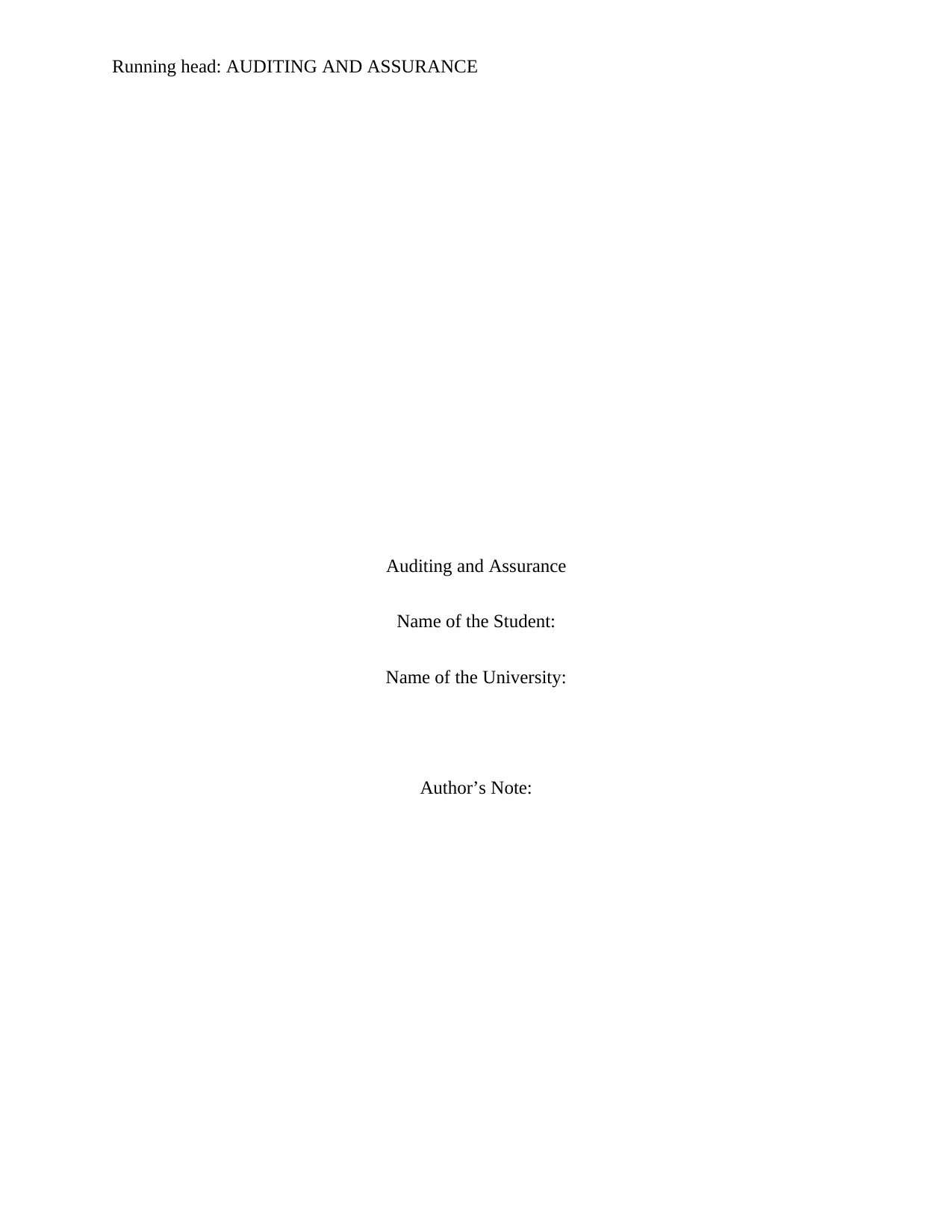
Running head: AUDITING AND ASSURANCE
Auditing and Assurance
Name of the Student:
Name of the University:
Author’s Note:
Auditing and Assurance
Name of the Student:
Name of the University:
Author’s Note:
Paraphrase This Document
Need a fresh take? Get an instant paraphrase of this document with our AI Paraphraser
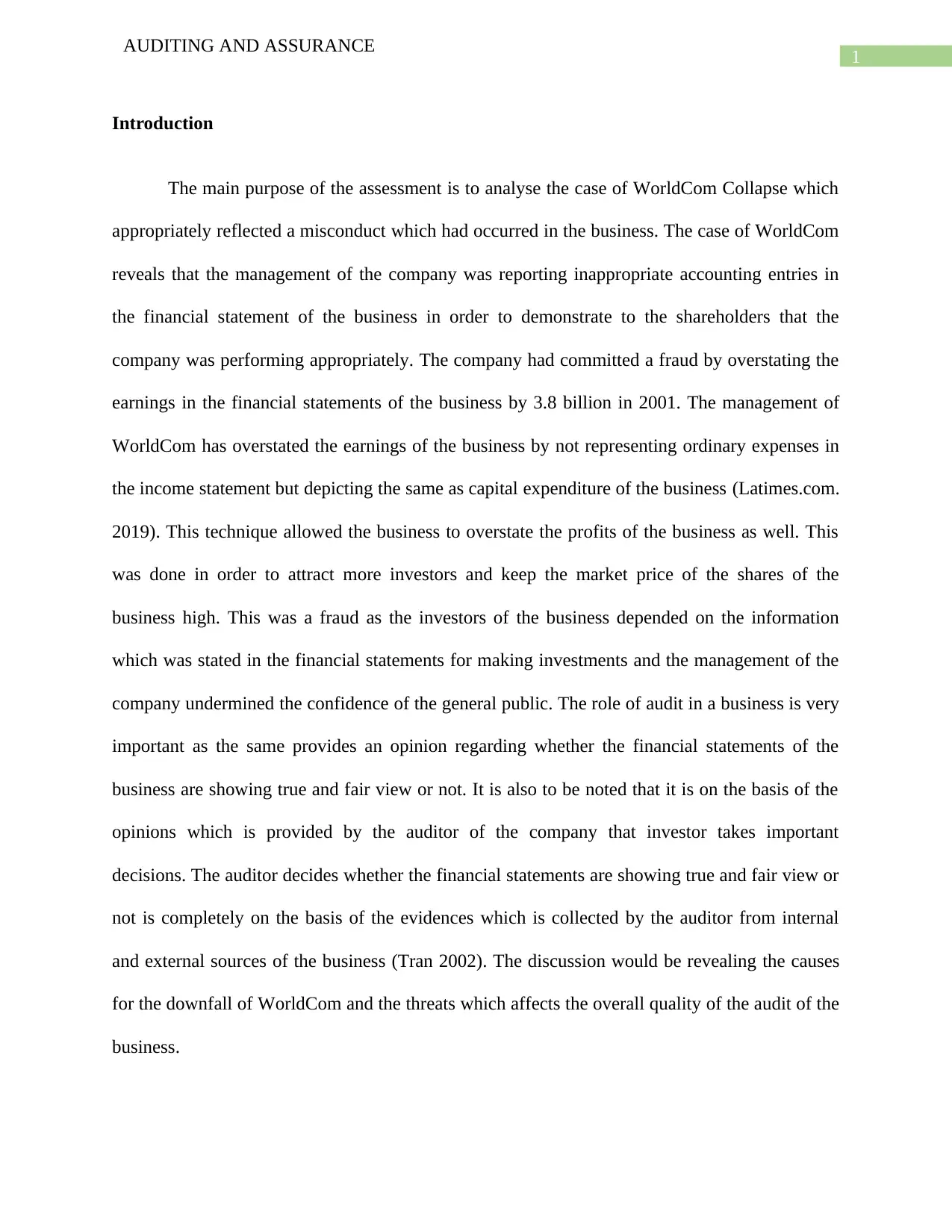
1
AUDITING AND ASSURANCE
Introduction
The main purpose of the assessment is to analyse the case of WorldCom Collapse which
appropriately reflected a misconduct which had occurred in the business. The case of WorldCom
reveals that the management of the company was reporting inappropriate accounting entries in
the financial statement of the business in order to demonstrate to the shareholders that the
company was performing appropriately. The company had committed a fraud by overstating the
earnings in the financial statements of the business by 3.8 billion in 2001. The management of
WorldCom has overstated the earnings of the business by not representing ordinary expenses in
the income statement but depicting the same as capital expenditure of the business (Latimes.com.
2019). This technique allowed the business to overstate the profits of the business as well. This
was done in order to attract more investors and keep the market price of the shares of the
business high. This was a fraud as the investors of the business depended on the information
which was stated in the financial statements for making investments and the management of the
company undermined the confidence of the general public. The role of audit in a business is very
important as the same provides an opinion regarding whether the financial statements of the
business are showing true and fair view or not. It is also to be noted that it is on the basis of the
opinions which is provided by the auditor of the company that investor takes important
decisions. The auditor decides whether the financial statements are showing true and fair view or
not is completely on the basis of the evidences which is collected by the auditor from internal
and external sources of the business (Tran 2002). The discussion would be revealing the causes
for the downfall of WorldCom and the threats which affects the overall quality of the audit of the
business.
AUDITING AND ASSURANCE
Introduction
The main purpose of the assessment is to analyse the case of WorldCom Collapse which
appropriately reflected a misconduct which had occurred in the business. The case of WorldCom
reveals that the management of the company was reporting inappropriate accounting entries in
the financial statement of the business in order to demonstrate to the shareholders that the
company was performing appropriately. The company had committed a fraud by overstating the
earnings in the financial statements of the business by 3.8 billion in 2001. The management of
WorldCom has overstated the earnings of the business by not representing ordinary expenses in
the income statement but depicting the same as capital expenditure of the business (Latimes.com.
2019). This technique allowed the business to overstate the profits of the business as well. This
was done in order to attract more investors and keep the market price of the shares of the
business high. This was a fraud as the investors of the business depended on the information
which was stated in the financial statements for making investments and the management of the
company undermined the confidence of the general public. The role of audit in a business is very
important as the same provides an opinion regarding whether the financial statements of the
business are showing true and fair view or not. It is also to be noted that it is on the basis of the
opinions which is provided by the auditor of the company that investor takes important
decisions. The auditor decides whether the financial statements are showing true and fair view or
not is completely on the basis of the evidences which is collected by the auditor from internal
and external sources of the business (Tran 2002). The discussion would be revealing the causes
for the downfall of WorldCom and the threats which affects the overall quality of the audit of the
business.
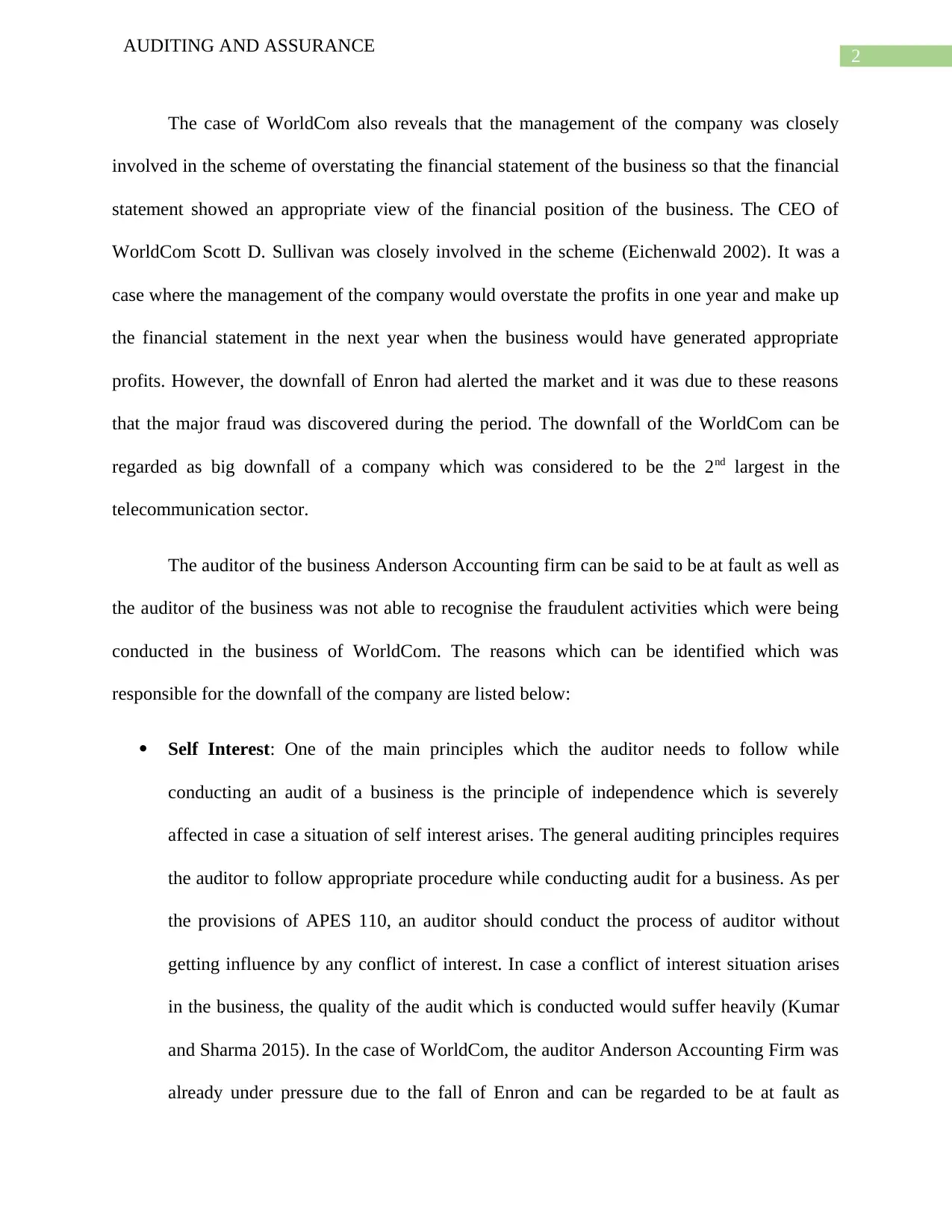
2
AUDITING AND ASSURANCE
The case of WorldCom also reveals that the management of the company was closely
involved in the scheme of overstating the financial statement of the business so that the financial
statement showed an appropriate view of the financial position of the business. The CEO of
WorldCom Scott D. Sullivan was closely involved in the scheme (Eichenwald 2002). It was a
case where the management of the company would overstate the profits in one year and make up
the financial statement in the next year when the business would have generated appropriate
profits. However, the downfall of Enron had alerted the market and it was due to these reasons
that the major fraud was discovered during the period. The downfall of the WorldCom can be
regarded as big downfall of a company which was considered to be the 2nd largest in the
telecommunication sector.
The auditor of the business Anderson Accounting firm can be said to be at fault as well as
the auditor of the business was not able to recognise the fraudulent activities which were being
conducted in the business of WorldCom. The reasons which can be identified which was
responsible for the downfall of the company are listed below:
Self Interest: One of the main principles which the auditor needs to follow while
conducting an audit of a business is the principle of independence which is severely
affected in case a situation of self interest arises. The general auditing principles requires
the auditor to follow appropriate procedure while conducting audit for a business. As per
the provisions of APES 110, an auditor should conduct the process of auditor without
getting influence by any conflict of interest. In case a conflict of interest situation arises
in the business, the quality of the audit which is conducted would suffer heavily (Kumar
and Sharma 2015). In the case of WorldCom, the auditor Anderson Accounting Firm was
already under pressure due to the fall of Enron and can be regarded to be at fault as
AUDITING AND ASSURANCE
The case of WorldCom also reveals that the management of the company was closely
involved in the scheme of overstating the financial statement of the business so that the financial
statement showed an appropriate view of the financial position of the business. The CEO of
WorldCom Scott D. Sullivan was closely involved in the scheme (Eichenwald 2002). It was a
case where the management of the company would overstate the profits in one year and make up
the financial statement in the next year when the business would have generated appropriate
profits. However, the downfall of Enron had alerted the market and it was due to these reasons
that the major fraud was discovered during the period. The downfall of the WorldCom can be
regarded as big downfall of a company which was considered to be the 2nd largest in the
telecommunication sector.
The auditor of the business Anderson Accounting firm can be said to be at fault as well as
the auditor of the business was not able to recognise the fraudulent activities which were being
conducted in the business of WorldCom. The reasons which can be identified which was
responsible for the downfall of the company are listed below:
Self Interest: One of the main principles which the auditor needs to follow while
conducting an audit of a business is the principle of independence which is severely
affected in case a situation of self interest arises. The general auditing principles requires
the auditor to follow appropriate procedure while conducting audit for a business. As per
the provisions of APES 110, an auditor should conduct the process of auditor without
getting influence by any conflict of interest. In case a conflict of interest situation arises
in the business, the quality of the audit which is conducted would suffer heavily (Kumar
and Sharma 2015). In the case of WorldCom, the auditor Anderson Accounting Firm was
already under pressure due to the fall of Enron and can be regarded to be at fault as
⊘ This is a preview!⊘
Do you want full access?
Subscribe today to unlock all pages.

Trusted by 1+ million students worldwide
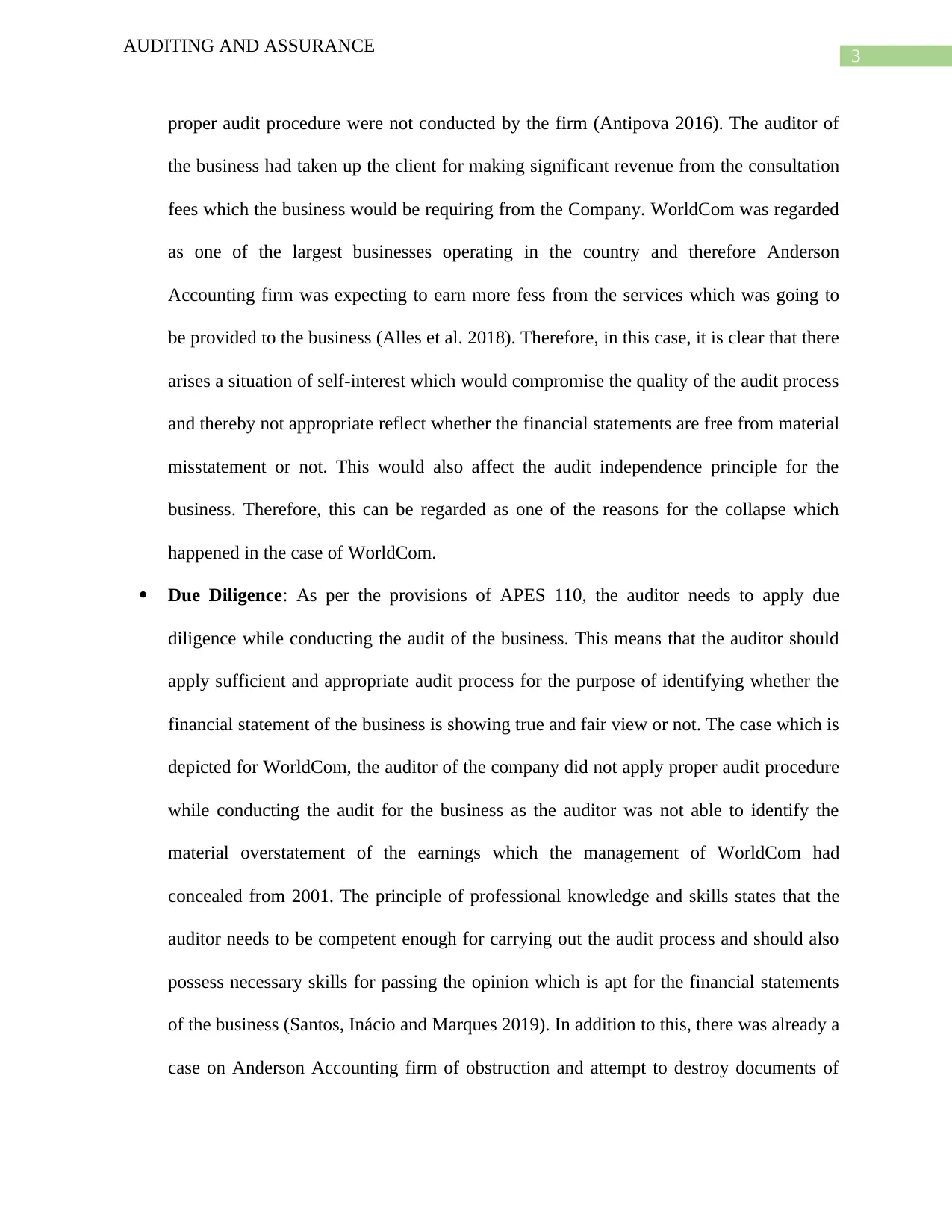
3
AUDITING AND ASSURANCE
proper audit procedure were not conducted by the firm (Antipova 2016). The auditor of
the business had taken up the client for making significant revenue from the consultation
fees which the business would be requiring from the Company. WorldCom was regarded
as one of the largest businesses operating in the country and therefore Anderson
Accounting firm was expecting to earn more fess from the services which was going to
be provided to the business (Alles et al. 2018). Therefore, in this case, it is clear that there
arises a situation of self-interest which would compromise the quality of the audit process
and thereby not appropriate reflect whether the financial statements are free from material
misstatement or not. This would also affect the audit independence principle for the
business. Therefore, this can be regarded as one of the reasons for the collapse which
happened in the case of WorldCom.
Due Diligence: As per the provisions of APES 110, the auditor needs to apply due
diligence while conducting the audit of the business. This means that the auditor should
apply sufficient and appropriate audit process for the purpose of identifying whether the
financial statement of the business is showing true and fair view or not. The case which is
depicted for WorldCom, the auditor of the company did not apply proper audit procedure
while conducting the audit for the business as the auditor was not able to identify the
material overstatement of the earnings which the management of WorldCom had
concealed from 2001. The principle of professional knowledge and skills states that the
auditor needs to be competent enough for carrying out the audit process and should also
possess necessary skills for passing the opinion which is apt for the financial statements
of the business (Santos, Inácio and Marques 2019). In addition to this, there was already a
case on Anderson Accounting firm of obstruction and attempt to destroy documents of
AUDITING AND ASSURANCE
proper audit procedure were not conducted by the firm (Antipova 2016). The auditor of
the business had taken up the client for making significant revenue from the consultation
fees which the business would be requiring from the Company. WorldCom was regarded
as one of the largest businesses operating in the country and therefore Anderson
Accounting firm was expecting to earn more fess from the services which was going to
be provided to the business (Alles et al. 2018). Therefore, in this case, it is clear that there
arises a situation of self-interest which would compromise the quality of the audit process
and thereby not appropriate reflect whether the financial statements are free from material
misstatement or not. This would also affect the audit independence principle for the
business. Therefore, this can be regarded as one of the reasons for the collapse which
happened in the case of WorldCom.
Due Diligence: As per the provisions of APES 110, the auditor needs to apply due
diligence while conducting the audit of the business. This means that the auditor should
apply sufficient and appropriate audit process for the purpose of identifying whether the
financial statement of the business is showing true and fair view or not. The case which is
depicted for WorldCom, the auditor of the company did not apply proper audit procedure
while conducting the audit for the business as the auditor was not able to identify the
material overstatement of the earnings which the management of WorldCom had
concealed from 2001. The principle of professional knowledge and skills states that the
auditor needs to be competent enough for carrying out the audit process and should also
possess necessary skills for passing the opinion which is apt for the financial statements
of the business (Santos, Inácio and Marques 2019). In addition to this, there was already a
case on Anderson Accounting firm of obstruction and attempt to destroy documents of
Paraphrase This Document
Need a fresh take? Get an instant paraphrase of this document with our AI Paraphraser
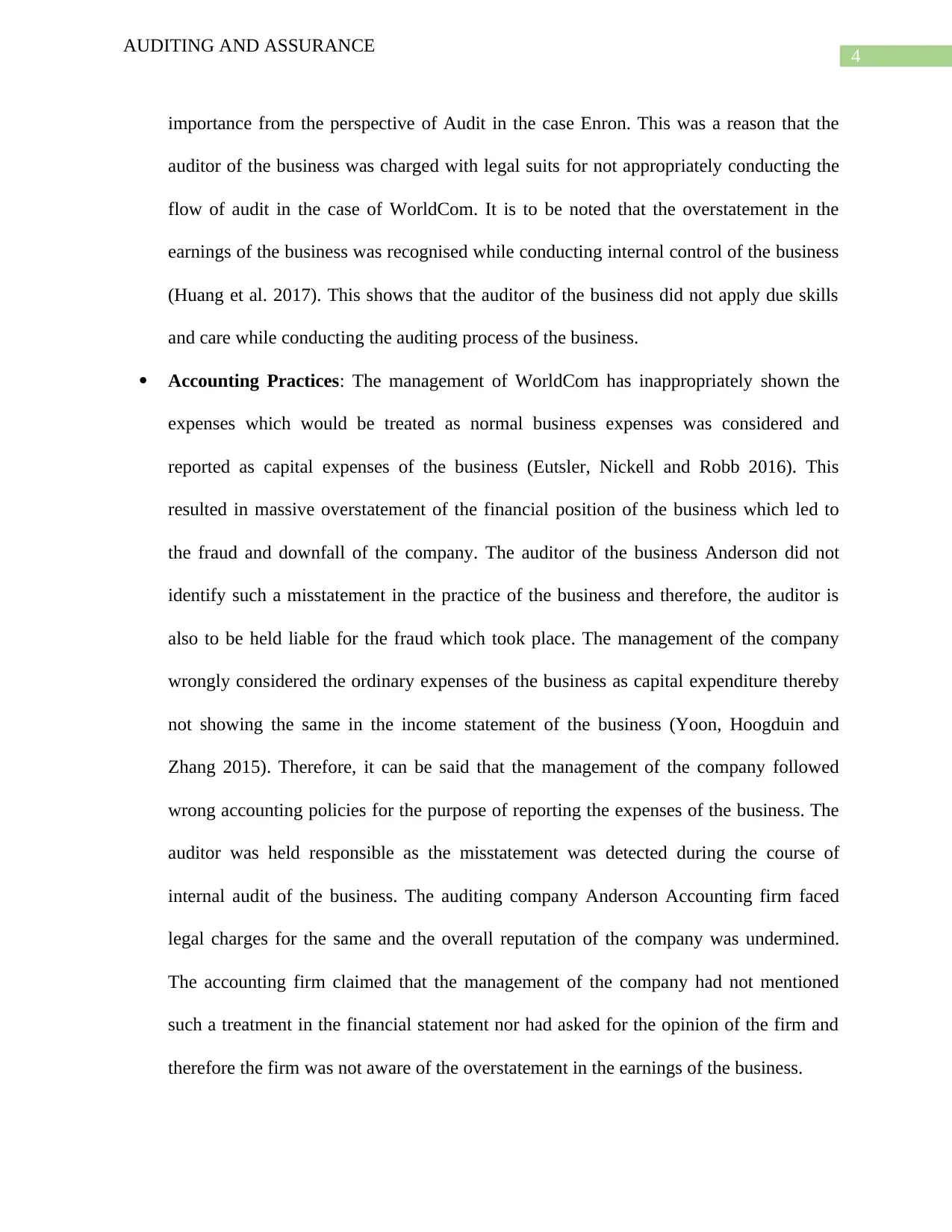
4
AUDITING AND ASSURANCE
importance from the perspective of Audit in the case Enron. This was a reason that the
auditor of the business was charged with legal suits for not appropriately conducting the
flow of audit in the case of WorldCom. It is to be noted that the overstatement in the
earnings of the business was recognised while conducting internal control of the business
(Huang et al. 2017). This shows that the auditor of the business did not apply due skills
and care while conducting the auditing process of the business.
Accounting Practices: The management of WorldCom has inappropriately shown the
expenses which would be treated as normal business expenses was considered and
reported as capital expenses of the business (Eutsler, Nickell and Robb 2016). This
resulted in massive overstatement of the financial position of the business which led to
the fraud and downfall of the company. The auditor of the business Anderson did not
identify such a misstatement in the practice of the business and therefore, the auditor is
also to be held liable for the fraud which took place. The management of the company
wrongly considered the ordinary expenses of the business as capital expenditure thereby
not showing the same in the income statement of the business (Yoon, Hoogduin and
Zhang 2015). Therefore, it can be said that the management of the company followed
wrong accounting policies for the purpose of reporting the expenses of the business. The
auditor was held responsible as the misstatement was detected during the course of
internal audit of the business. The auditing company Anderson Accounting firm faced
legal charges for the same and the overall reputation of the company was undermined.
The accounting firm claimed that the management of the company had not mentioned
such a treatment in the financial statement nor had asked for the opinion of the firm and
therefore the firm was not aware of the overstatement in the earnings of the business.
AUDITING AND ASSURANCE
importance from the perspective of Audit in the case Enron. This was a reason that the
auditor of the business was charged with legal suits for not appropriately conducting the
flow of audit in the case of WorldCom. It is to be noted that the overstatement in the
earnings of the business was recognised while conducting internal control of the business
(Huang et al. 2017). This shows that the auditor of the business did not apply due skills
and care while conducting the auditing process of the business.
Accounting Practices: The management of WorldCom has inappropriately shown the
expenses which would be treated as normal business expenses was considered and
reported as capital expenses of the business (Eutsler, Nickell and Robb 2016). This
resulted in massive overstatement of the financial position of the business which led to
the fraud and downfall of the company. The auditor of the business Anderson did not
identify such a misstatement in the practice of the business and therefore, the auditor is
also to be held liable for the fraud which took place. The management of the company
wrongly considered the ordinary expenses of the business as capital expenditure thereby
not showing the same in the income statement of the business (Yoon, Hoogduin and
Zhang 2015). Therefore, it can be said that the management of the company followed
wrong accounting policies for the purpose of reporting the expenses of the business. The
auditor was held responsible as the misstatement was detected during the course of
internal audit of the business. The auditing company Anderson Accounting firm faced
legal charges for the same and the overall reputation of the company was undermined.
The accounting firm claimed that the management of the company had not mentioned
such a treatment in the financial statement nor had asked for the opinion of the firm and
therefore the firm was not aware of the overstatement in the earnings of the business.
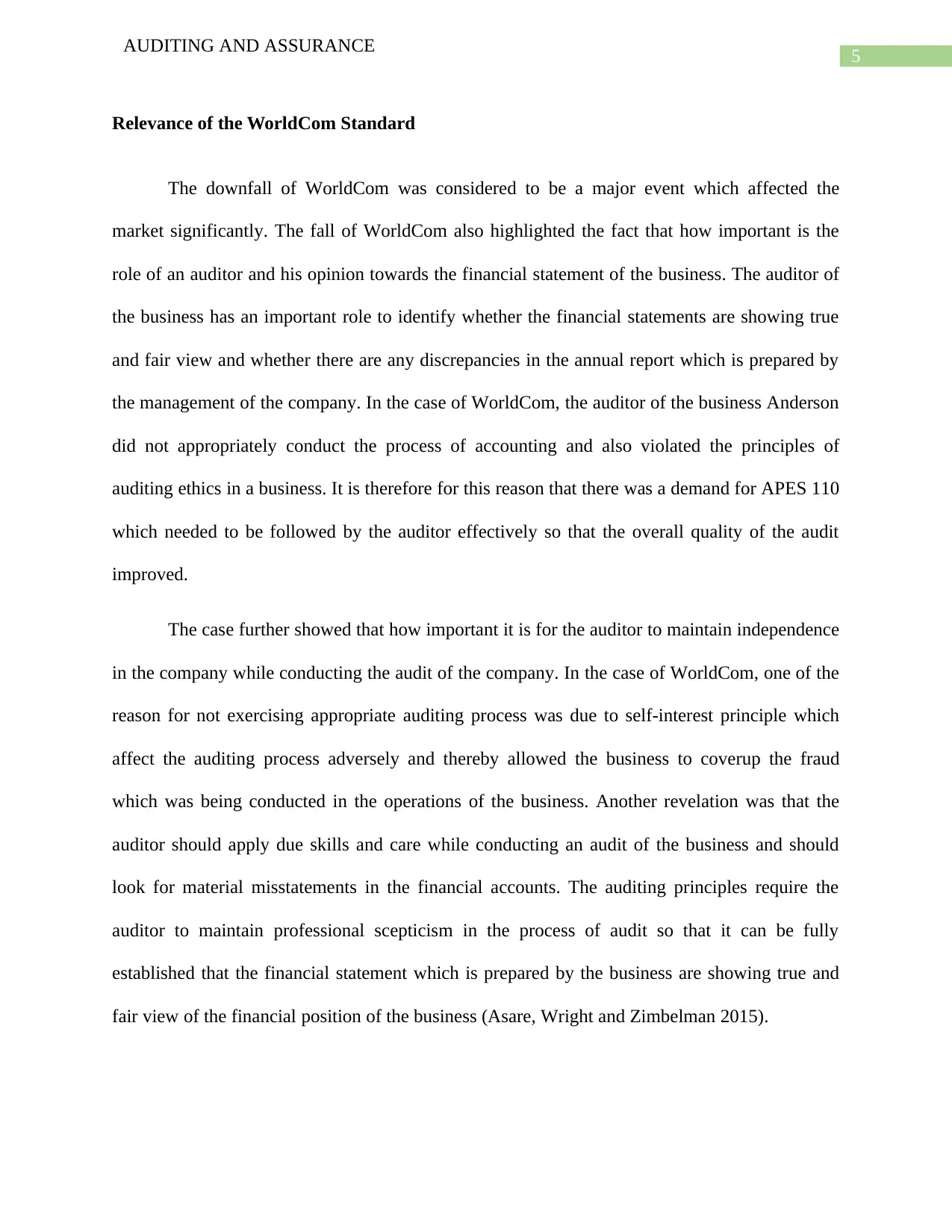
5
AUDITING AND ASSURANCE
Relevance of the WorldCom Standard
The downfall of WorldCom was considered to be a major event which affected the
market significantly. The fall of WorldCom also highlighted the fact that how important is the
role of an auditor and his opinion towards the financial statement of the business. The auditor of
the business has an important role to identify whether the financial statements are showing true
and fair view and whether there are any discrepancies in the annual report which is prepared by
the management of the company. In the case of WorldCom, the auditor of the business Anderson
did not appropriately conduct the process of accounting and also violated the principles of
auditing ethics in a business. It is therefore for this reason that there was a demand for APES 110
which needed to be followed by the auditor effectively so that the overall quality of the audit
improved.
The case further showed that how important it is for the auditor to maintain independence
in the company while conducting the audit of the company. In the case of WorldCom, one of the
reason for not exercising appropriate auditing process was due to self-interest principle which
affect the auditing process adversely and thereby allowed the business to coverup the fraud
which was being conducted in the operations of the business. Another revelation was that the
auditor should apply due skills and care while conducting an audit of the business and should
look for material misstatements in the financial accounts. The auditing principles require the
auditor to maintain professional scepticism in the process of audit so that it can be fully
established that the financial statement which is prepared by the business are showing true and
fair view of the financial position of the business (Asare, Wright and Zimbelman 2015).
AUDITING AND ASSURANCE
Relevance of the WorldCom Standard
The downfall of WorldCom was considered to be a major event which affected the
market significantly. The fall of WorldCom also highlighted the fact that how important is the
role of an auditor and his opinion towards the financial statement of the business. The auditor of
the business has an important role to identify whether the financial statements are showing true
and fair view and whether there are any discrepancies in the annual report which is prepared by
the management of the company. In the case of WorldCom, the auditor of the business Anderson
did not appropriately conduct the process of accounting and also violated the principles of
auditing ethics in a business. It is therefore for this reason that there was a demand for APES 110
which needed to be followed by the auditor effectively so that the overall quality of the audit
improved.
The case further showed that how important it is for the auditor to maintain independence
in the company while conducting the audit of the company. In the case of WorldCom, one of the
reason for not exercising appropriate auditing process was due to self-interest principle which
affect the auditing process adversely and thereby allowed the business to coverup the fraud
which was being conducted in the operations of the business. Another revelation was that the
auditor should apply due skills and care while conducting an audit of the business and should
look for material misstatements in the financial accounts. The auditing principles require the
auditor to maintain professional scepticism in the process of audit so that it can be fully
established that the financial statement which is prepared by the business are showing true and
fair view of the financial position of the business (Asare, Wright and Zimbelman 2015).
⊘ This is a preview!⊘
Do you want full access?
Subscribe today to unlock all pages.

Trusted by 1+ million students worldwide
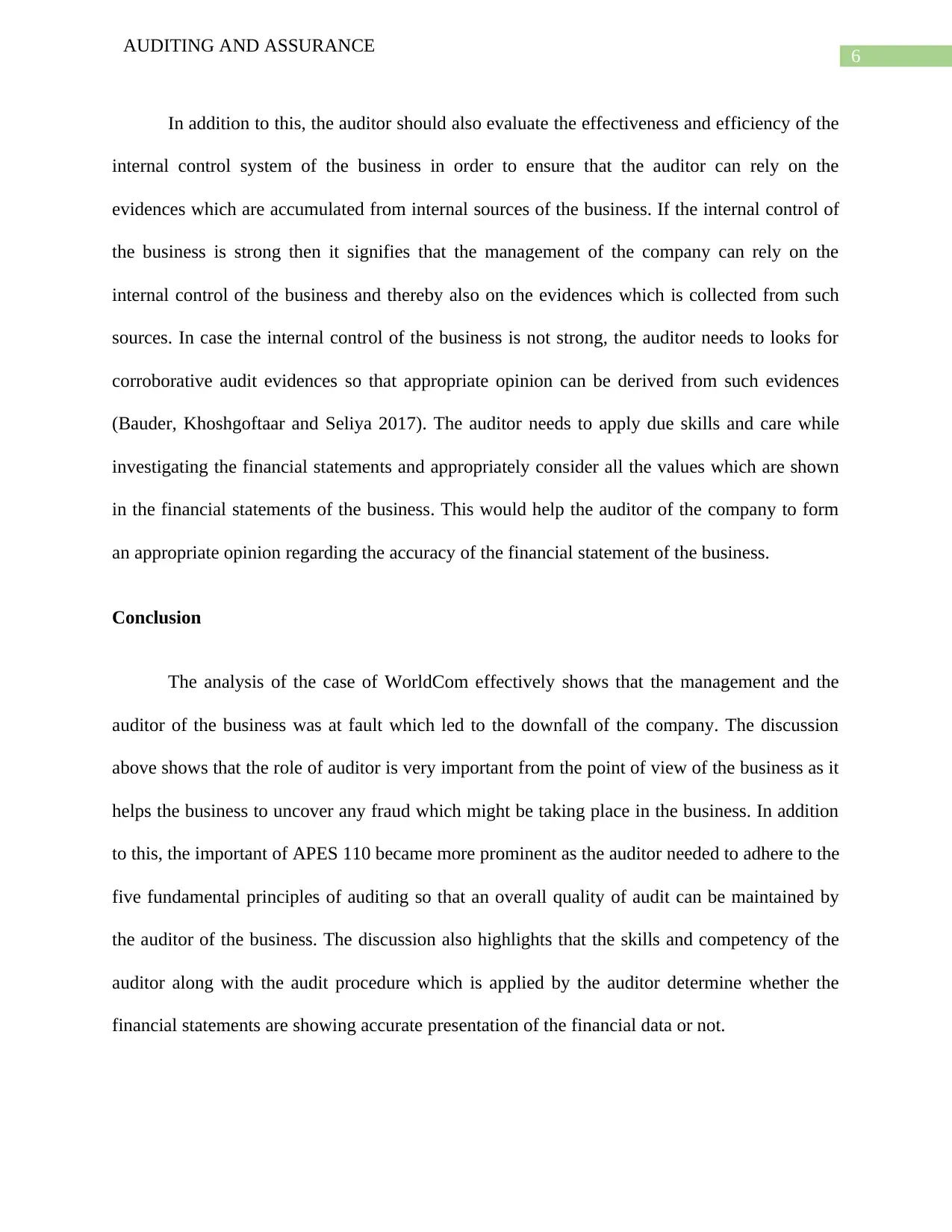
6
AUDITING AND ASSURANCE
In addition to this, the auditor should also evaluate the effectiveness and efficiency of the
internal control system of the business in order to ensure that the auditor can rely on the
evidences which are accumulated from internal sources of the business. If the internal control of
the business is strong then it signifies that the management of the company can rely on the
internal control of the business and thereby also on the evidences which is collected from such
sources. In case the internal control of the business is not strong, the auditor needs to looks for
corroborative audit evidences so that appropriate opinion can be derived from such evidences
(Bauder, Khoshgoftaar and Seliya 2017). The auditor needs to apply due skills and care while
investigating the financial statements and appropriately consider all the values which are shown
in the financial statements of the business. This would help the auditor of the company to form
an appropriate opinion regarding the accuracy of the financial statement of the business.
Conclusion
The analysis of the case of WorldCom effectively shows that the management and the
auditor of the business was at fault which led to the downfall of the company. The discussion
above shows that the role of auditor is very important from the point of view of the business as it
helps the business to uncover any fraud which might be taking place in the business. In addition
to this, the important of APES 110 became more prominent as the auditor needed to adhere to the
five fundamental principles of auditing so that an overall quality of audit can be maintained by
the auditor of the business. The discussion also highlights that the skills and competency of the
auditor along with the audit procedure which is applied by the auditor determine whether the
financial statements are showing accurate presentation of the financial data or not.
AUDITING AND ASSURANCE
In addition to this, the auditor should also evaluate the effectiveness and efficiency of the
internal control system of the business in order to ensure that the auditor can rely on the
evidences which are accumulated from internal sources of the business. If the internal control of
the business is strong then it signifies that the management of the company can rely on the
internal control of the business and thereby also on the evidences which is collected from such
sources. In case the internal control of the business is not strong, the auditor needs to looks for
corroborative audit evidences so that appropriate opinion can be derived from such evidences
(Bauder, Khoshgoftaar and Seliya 2017). The auditor needs to apply due skills and care while
investigating the financial statements and appropriately consider all the values which are shown
in the financial statements of the business. This would help the auditor of the company to form
an appropriate opinion regarding the accuracy of the financial statement of the business.
Conclusion
The analysis of the case of WorldCom effectively shows that the management and the
auditor of the business was at fault which led to the downfall of the company. The discussion
above shows that the role of auditor is very important from the point of view of the business as it
helps the business to uncover any fraud which might be taking place in the business. In addition
to this, the important of APES 110 became more prominent as the auditor needed to adhere to the
five fundamental principles of auditing so that an overall quality of audit can be maintained by
the auditor of the business. The discussion also highlights that the skills and competency of the
auditor along with the audit procedure which is applied by the auditor determine whether the
financial statements are showing accurate presentation of the financial data or not.
Paraphrase This Document
Need a fresh take? Get an instant paraphrase of this document with our AI Paraphraser
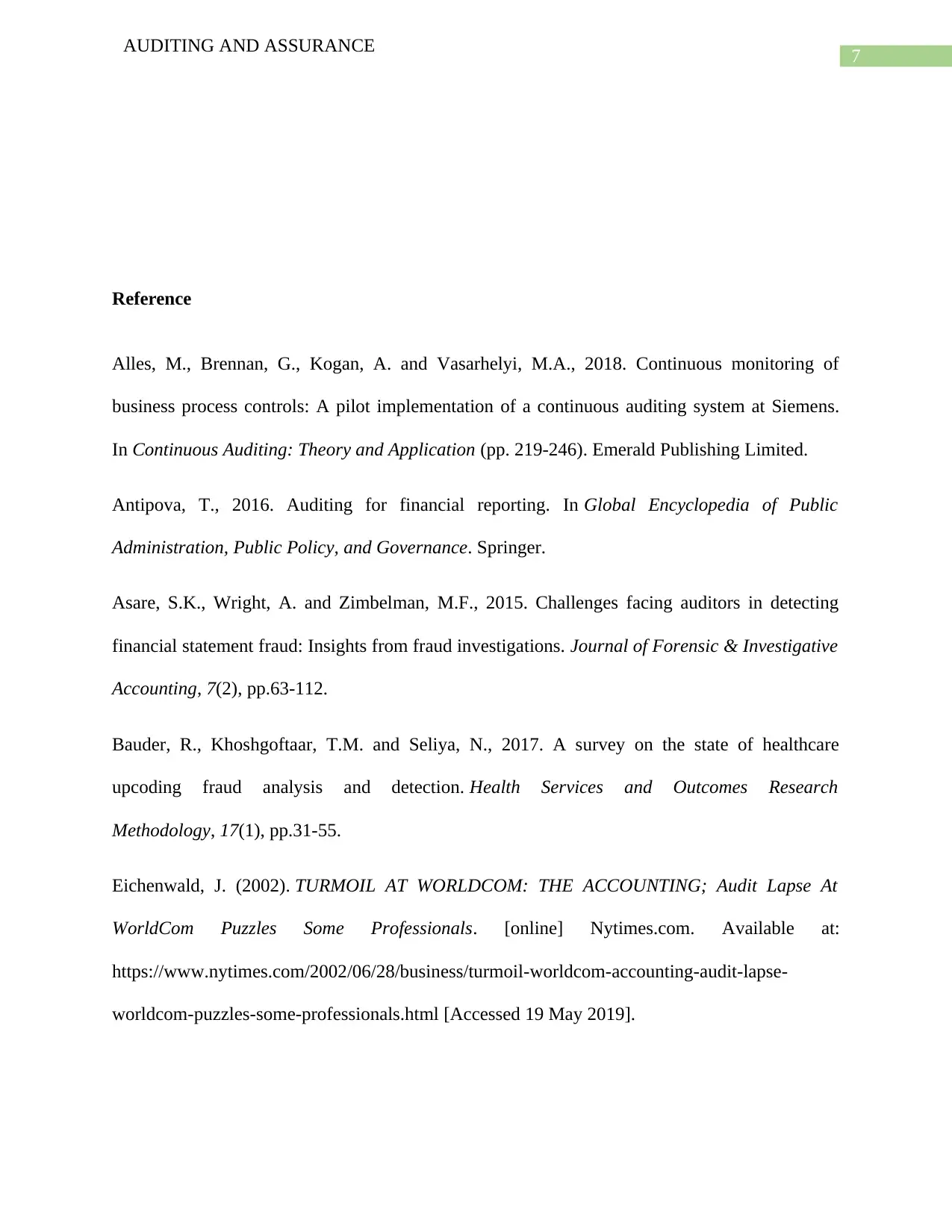
7
AUDITING AND ASSURANCE
Reference
Alles, M., Brennan, G., Kogan, A. and Vasarhelyi, M.A., 2018. Continuous monitoring of
business process controls: A pilot implementation of a continuous auditing system at Siemens.
In Continuous Auditing: Theory and Application (pp. 219-246). Emerald Publishing Limited.
Antipova, T., 2016. Auditing for financial reporting. In Global Encyclopedia of Public
Administration, Public Policy, and Governance. Springer.
Asare, S.K., Wright, A. and Zimbelman, M.F., 2015. Challenges facing auditors in detecting
financial statement fraud: Insights from fraud investigations. Journal of Forensic & Investigative
Accounting, 7(2), pp.63-112.
Bauder, R., Khoshgoftaar, T.M. and Seliya, N., 2017. A survey on the state of healthcare
upcoding fraud analysis and detection. Health Services and Outcomes Research
Methodology, 17(1), pp.31-55.
Eichenwald, J. (2002). TURMOIL AT WORLDCOM: THE ACCOUNTING; Audit Lapse At
WorldCom Puzzles Some Professionals. [online] Nytimes.com. Available at:
https://www.nytimes.com/2002/06/28/business/turmoil-worldcom-accounting-audit-lapse-
worldcom-puzzles-some-professionals.html [Accessed 19 May 2019].
AUDITING AND ASSURANCE
Reference
Alles, M., Brennan, G., Kogan, A. and Vasarhelyi, M.A., 2018. Continuous monitoring of
business process controls: A pilot implementation of a continuous auditing system at Siemens.
In Continuous Auditing: Theory and Application (pp. 219-246). Emerald Publishing Limited.
Antipova, T., 2016. Auditing for financial reporting. In Global Encyclopedia of Public
Administration, Public Policy, and Governance. Springer.
Asare, S.K., Wright, A. and Zimbelman, M.F., 2015. Challenges facing auditors in detecting
financial statement fraud: Insights from fraud investigations. Journal of Forensic & Investigative
Accounting, 7(2), pp.63-112.
Bauder, R., Khoshgoftaar, T.M. and Seliya, N., 2017. A survey on the state of healthcare
upcoding fraud analysis and detection. Health Services and Outcomes Research
Methodology, 17(1), pp.31-55.
Eichenwald, J. (2002). TURMOIL AT WORLDCOM: THE ACCOUNTING; Audit Lapse At
WorldCom Puzzles Some Professionals. [online] Nytimes.com. Available at:
https://www.nytimes.com/2002/06/28/business/turmoil-worldcom-accounting-audit-lapse-
worldcom-puzzles-some-professionals.html [Accessed 19 May 2019].
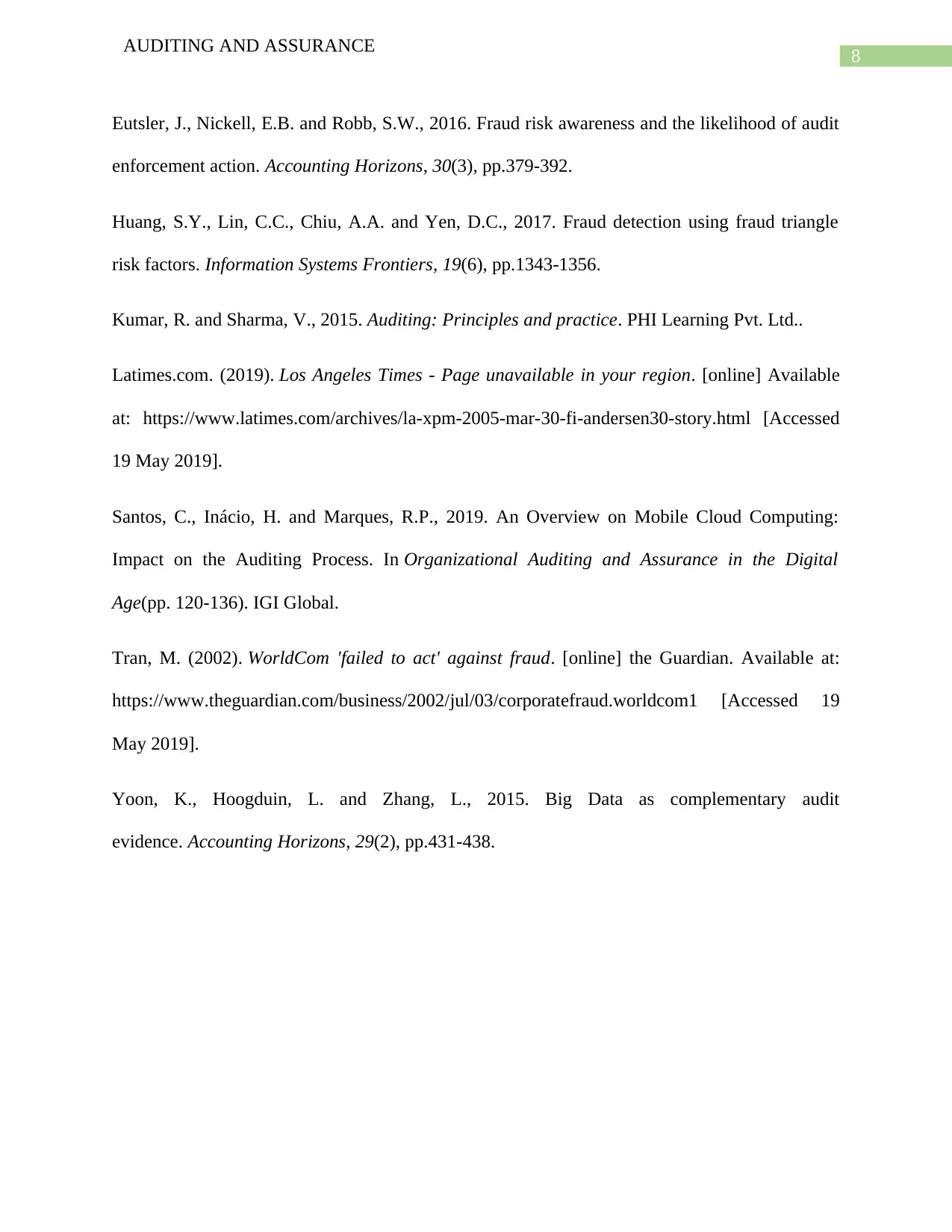
8
AUDITING AND ASSURANCE
Eutsler, J., Nickell, E.B. and Robb, S.W., 2016. Fraud risk awareness and the likelihood of audit
enforcement action. Accounting Horizons, 30(3), pp.379-392.
Huang, S.Y., Lin, C.C., Chiu, A.A. and Yen, D.C., 2017. Fraud detection using fraud triangle
risk factors. Information Systems Frontiers, 19(6), pp.1343-1356.
Kumar, R. and Sharma, V., 2015. Auditing: Principles and practice. PHI Learning Pvt. Ltd..
Latimes.com. (2019). Los Angeles Times - Page unavailable in your region. [online] Available
at: https://www.latimes.com/archives/la-xpm-2005-mar-30-fi-andersen30-story.html [Accessed
19 May 2019].
Santos, C., Inácio, H. and Marques, R.P., 2019. An Overview on Mobile Cloud Computing:
Impact on the Auditing Process. In Organizational Auditing and Assurance in the Digital
Age(pp. 120-136). IGI Global.
Tran, M. (2002). WorldCom 'failed to act' against fraud. [online] the Guardian. Available at:
https://www.theguardian.com/business/2002/jul/03/corporatefraud.worldcom1 [Accessed 19
May 2019].
Yoon, K., Hoogduin, L. and Zhang, L., 2015. Big Data as complementary audit
evidence. Accounting Horizons, 29(2), pp.431-438.
AUDITING AND ASSURANCE
Eutsler, J., Nickell, E.B. and Robb, S.W., 2016. Fraud risk awareness and the likelihood of audit
enforcement action. Accounting Horizons, 30(3), pp.379-392.
Huang, S.Y., Lin, C.C., Chiu, A.A. and Yen, D.C., 2017. Fraud detection using fraud triangle
risk factors. Information Systems Frontiers, 19(6), pp.1343-1356.
Kumar, R. and Sharma, V., 2015. Auditing: Principles and practice. PHI Learning Pvt. Ltd..
Latimes.com. (2019). Los Angeles Times - Page unavailable in your region. [online] Available
at: https://www.latimes.com/archives/la-xpm-2005-mar-30-fi-andersen30-story.html [Accessed
19 May 2019].
Santos, C., Inácio, H. and Marques, R.P., 2019. An Overview on Mobile Cloud Computing:
Impact on the Auditing Process. In Organizational Auditing and Assurance in the Digital
Age(pp. 120-136). IGI Global.
Tran, M. (2002). WorldCom 'failed to act' against fraud. [online] the Guardian. Available at:
https://www.theguardian.com/business/2002/jul/03/corporatefraud.worldcom1 [Accessed 19
May 2019].
Yoon, K., Hoogduin, L. and Zhang, L., 2015. Big Data as complementary audit
evidence. Accounting Horizons, 29(2), pp.431-438.
⊘ This is a preview!⊘
Do you want full access?
Subscribe today to unlock all pages.

Trusted by 1+ million students worldwide
1 out of 9
Related Documents
Your All-in-One AI-Powered Toolkit for Academic Success.
+13062052269
info@desklib.com
Available 24*7 on WhatsApp / Email
![[object Object]](/_next/static/media/star-bottom.7253800d.svg)
Unlock your academic potential
Copyright © 2020–2026 A2Z Services. All Rights Reserved. Developed and managed by ZUCOL.





